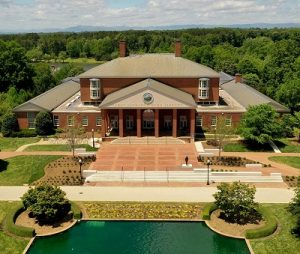Pathways course to guide students through The Furman Advantage
April 27, 2022Furman University faculty have voted to make Pathways, a two-year program central to The Furman Advantage, a core curriculum requirement for all students starting in Fall 2022.
Pathways is a one-credit class each semester for first- and second-year students that builds a foundation of self-awareness, helping students learn who they are, what they value and where their interests lie. Sophomores also build a résumé, have an informational interview with an alumnus, and learn other career skills and how to tell their story. The program has been in a pilot phase with about a third of Furman’s students participating over the past four years.
Pathways is led by faculty advisors and, for first-year students, upperclass peer mentors who help students think about what they want to do with their lives, how to integrate their academics, their engaged learning experiences such as study away, research and internships, and their career goals, said Michelle Horhota, associate dean for mentoring and advising and a professor of psychology who oversees the Pathways program.
“With Pathways, we’ve created something unique in higher education, a program for all students that provides mentorship and reflection so students graduate ready for lives of purpose and accelerated careers,” said Furman President Elizabeth Davis. “Congratulations to Dr. Horhota and her team for their hard work in developing Pathways.”
“I am thrilled that we will soon provide Pathways to all students,” Horhota said. “The student reflections collected during the pilot phase tell us we are giving students a foundation that helps them connect to resources, create community and make the most of their Furman experience.”
In the pilot, students who participated in Pathways reported higher satisfaction scores for advising than students not in Pathways. The early data also suggest that Pathways benefits students from low-income families, first-generation college students and students of color in terms of
- increased retention,
- increased participation in engaged learning experiences, and
- earlier and more frequent appointments with career counseling.
“Pathways teaches you about yourself and your classmates and how to grow in the community,” said Libby Hamilton ’24, a vocal performance and music theory major. “One of the things we did was a strengths assessment, and I found out that one of my strengths is empathy. We had a presentation about what the strengths meant and how to work in a group. It was practical. It will 100 percent help with my career.”
For juniors and seniors, their pathways continue at the department level, where information builds on what students learn in years one and two, tailored to their specific majors. Students reflect on what they’re learning through their major classes and related experiences, such as internships, research and study away, and how that is preparing them for opportunities after Furman, whether it be a job or graduate or professional school.
“You’re learning about career opportunities within that discipline, and you’re learning the discipline-specific norms,” Horhota said. Students learn the culture within their chosen discipline, the expectations in different fields, and what the workplace environment may be like.
Every student has a chance to learn what careers or graduate school options are available to them, whether they’re majoring in chemistry or theatre, economics or health sciences.
Each academic department provides these experiences differently. Multiple departments host a series of events aimed to help their majors reflect on their academic pathways, including graduate school nights, alumni panels and sessions about engaged learning opportunities or career competency development. Other departments, such as Earth, Environmental, and Sustainability Sciences, hold mini-retreats for students at different stages of their Furman career.
Health Sciences and English have created required courses to continue these lessons within their curricula. And yet others, such as Theatre Arts, bring in alumni to provide workshops to learn specific techniques and share their professional journeys, with topics ranging from mask making to set design.
“Exposing students to possibilities while they are undergraduates gives them a more concrete idea of what they want to do,” Horhota said. “At graduation they have a better sense of how what they have learned at Furman informs what they want to do next, and the steps they need to take to get there.”
For more information, contact the Furman News and Media Strategy office at 919-548-6493.




















